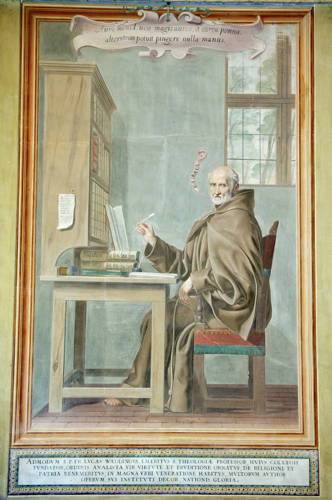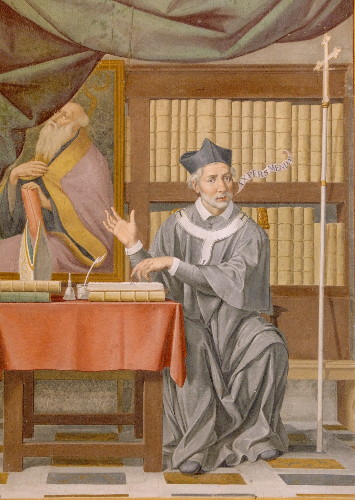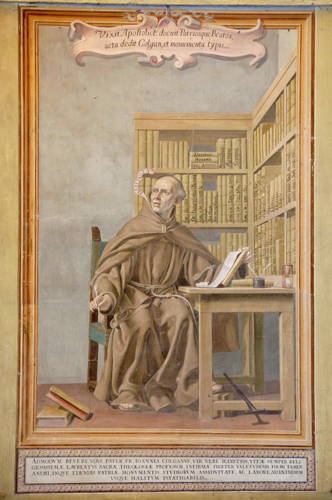Seventeenth-Century Irish Franciscans: Leading Historians and Theologians
A number of seventeenth-century Irish Franciscans were among the most significant historians and theologians in Irish history and their legacy survives to the present day.
Mícheál Ó Cléirigh
The great chronicle popularly known as the Annals of the Four Masters (Annála Ríoghachta Éireann) was compiled under the direction of the Franciscan lay-brother from Donegal, Mícheál Ó Cléirigh (d. 1643). This chronicle covers a period of about 4,500 years from the biblical flood to 1616 AD. The core value of the Annals of the Four Masters lies in the considerable records of the deeds and deaths of medieval Irish kings, lords and churchmen, in the preservation of place names, the inclusion of Irish poetry and prose narratives and in its creation of a 'national' history. Mícheál Ó Cléirigh and his learned team succeeded in compiling this remarkable chronicle with the financial support of the nobleman Fearghal Ó Gadhra between 1632 and 1636.

Luke Wadding
Luke Wadding (1588-1657) was born into a prominent Old English merchant family in Waterford. After the death of his parents from the plague in 1602, he was brought by his brother Matthew to Lisbon and soon afterwards he joined the Franciscans. He was ordained in 1613. He began his studies in philosophy and theology in Portugal and was then invited to join the Spanish Franciscan province where he became a lecturer in theology in the renowned University of Salamanca.
In July 1618, Wadding was chosen by Bishop Antonio de Trejo, who led a royal Spanish delegation to Rome to discuss the doctrine of the Immaculate Conception with Pope Paul V, as theologian and secretary to the delegation. In Rome, Wadding began a prolific career in historical, philosophical and theological writings. His fame as a scholar mainly rests on his commentaries on the works of the late medieval Franciscan philosopher Duns Scotus and on his masterly treatises on the history of the Franciscan Order, the Annales Minorum (the order’s history from 1208 to 1540) and the Scriptores Ordinis Minorum (a collection of the primary sources of the order). With the assistance of the cardinal protector of Ireland and one of Wadding’s many influential friends in Rome, Cardinal Ludovico Ludovisi, he founded St Isidore’s College in 1625.
Although Wadding’s adult life was spent on the Continent his influence in Ireland and his interest in Irish affairs was considerable. From the 1630s he was consulted by the Vatican in regard to episcopal appointments and other offices in Ireland. His influence can be seen at its height during the Confederacy in the early 1640s. His pleas to an otherwise disinterested Papacy and Spanish monarchy caused Archbishop Rinuccini to be sent as papal envoy to Ireland in 1645 and he also managed to obtain support for Owen Roe O’Neill and the Irish brigades on the Continent to return to Ireland. He died and was buried in St Isidore’s in Rome in November 1657.
Regarded as the father of the history of the Franciscans to this day Wadding was recognised in January 2007 when the archive of the General Order in Rome was named after him. The Institute plans to publish an extensive study of Luke Wadding in the future.

Florence Conry
Flaithrí Ó Maoil Chonaire (Florence Conry) (c.1560-1629) was the embodiment of the Irish Franciscan network that extended throughout Europe in the seventeenth century. During his lifetime he acted as an eminent prelate, diplomat, translator and theologian. He was born into the learned family of Uí Mhaoil Chonaire of Co Roscommon and joined the Franciscans in Salamanca in Spain. He was appointed Papal Legate to Ireland and in that capacity was at the battle of Kinsale in December 1601. He returned to Spain with Red Hugh O’Donnell and was with him at his death in 1602. Four years later Ó Maoil Chonaire was appointed Provincial of the Irish Franciscans. He gained permission from Philip II of Spain to establish St Anthony’s College in Louvain. He took up residence there in May 1607. He was appointed Archbishop of Tuam by Pope Paul V in 1609 but never returned to Ireland. Ó Maoil Chonaire’s status as a diplomat is matched by his significance as an author of religious texts aimed at instructing the Catholic population in Ireland and of participating in theological debates of the Counter-Reformation. He died in Madrid in 1629.

John Colgan
The Irish Franciscans in Louvain were involved in many projects including the compilation of the lives of Irish saints. This work, greatly influenced by Jesuit Bollandist scholars in Antwerp, formed part of the Catholic Counter-Reformation campaign to publish saints’ lives to the highest standards to refute Protestant accusations of superstition. The colossal programme undertaken in Louvain resulted in the publication in print of two great volumes relating to Irish saints – John Colgan’s Trias Thaumaturgae and Acta Sanctorum Hiberniae. Colgan was born in Donegal but spent most of his life on the Continent. When Colgan died in 1658, it was claimed that he had restored ‘her saints to the island of saints’.